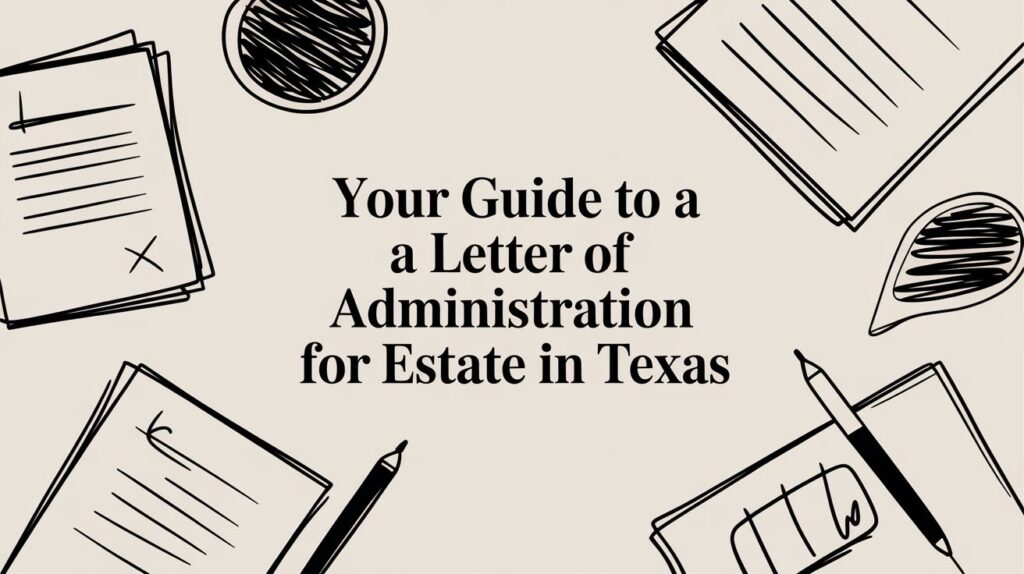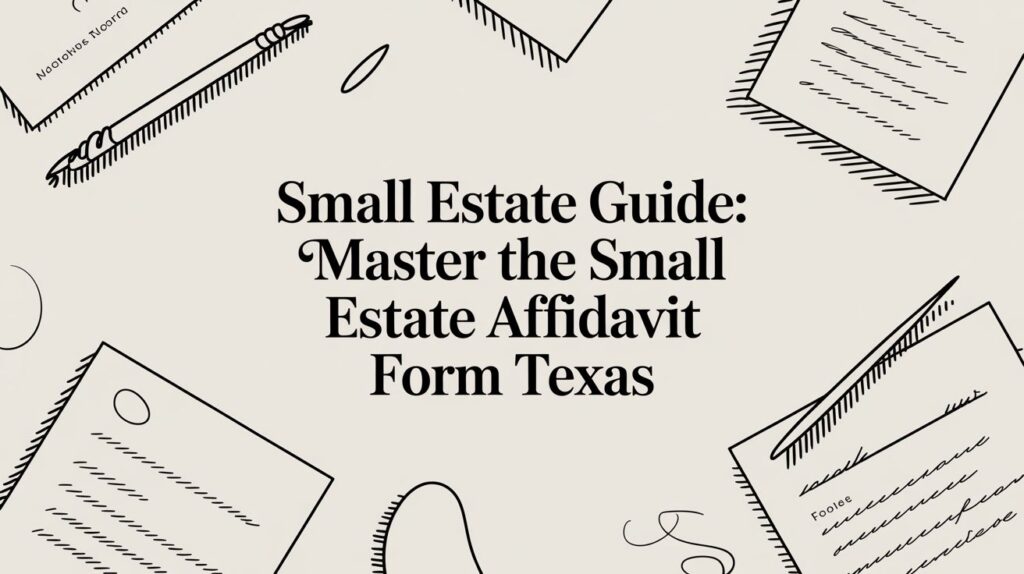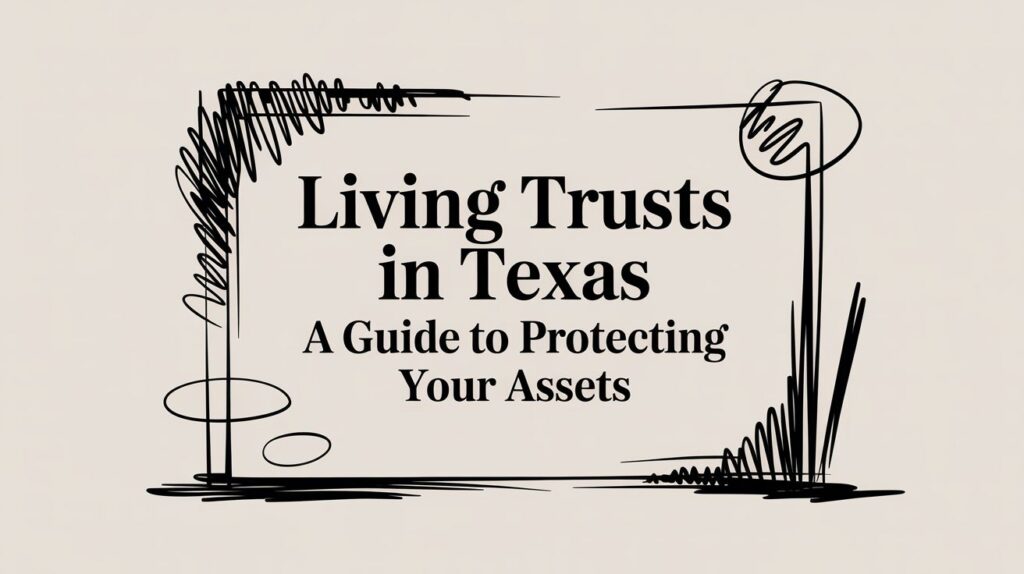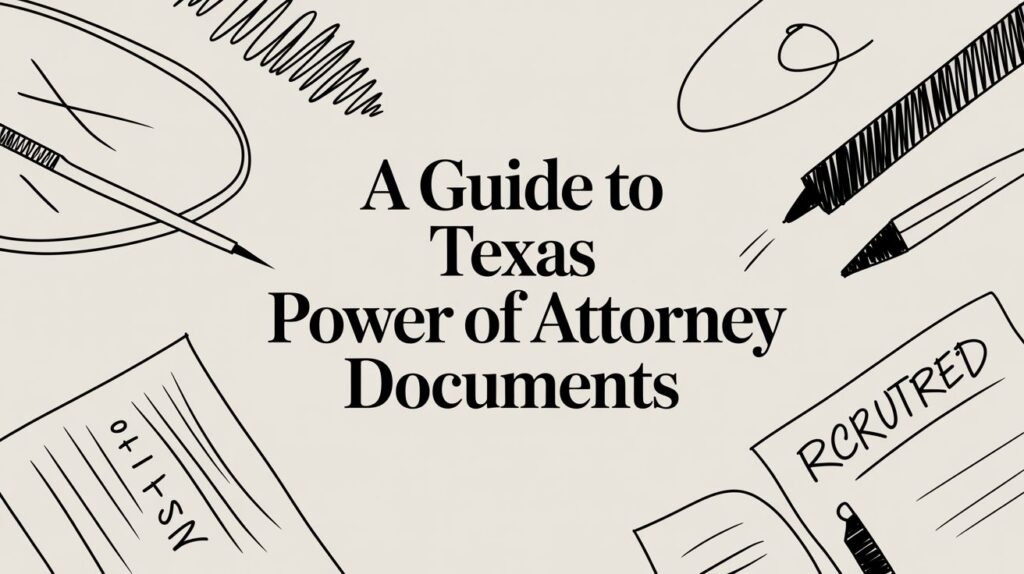When a loved one passes, managing their final affairs can feel overwhelming—but with the right legal guidance, it doesn’t have to be. In Texas, settling an estate typically takes anywhere from 9 to 18 months. Sometimes, if the estate is complex or family members disagree, it can take longer. This guide is here to cut through the confusion, explaining complex legal matters in plain English and giving you a clear, step-by-step look at the entire process.
Understanding the Journey of Settling an Estate
Losing a family member is overwhelming on its own, and the legal duties that follow can feel like an impossibly heavy weight. The process of settling an estate—often called probate or estate administration—is a formal, court-supervised procedure here in Texas. Its main job is to make sure the deceased person's final wishes are carried out, their debts are settled, and whatever is left over gets legally transferred to the right people.
Think of it less like a single task and more like a journey with distinct phases. Each stage has its own set of rules and its own timeline. You'll be dealing with court filings, managing finances, and keeping everyone in the loop. With the right guidance, it doesn't have to be a source of constant stress.
To help you get a bird's-eye view, we've put together a quick summary of what to expect.
Typical Phases of the Texas Estate Settlement Timeline
| Phase | Average Duration | Primary Executor Responsibilities |
|---|---|---|
| Phase 1: Initial Filings & Executor Appointment | 1-2 Months | Filing the will with the probate court, attending the initial hearing, and officially being appointed as the executor. |
| Phase 2: Notifying Heirs & Creditors | 3-6 Months | Sending formal notices to all beneficiaries and publishing a notice for potential creditors to submit claims. |
| Phase 3: Inventory & Appraisal of Assets | 2-4 Months | Creating a detailed inventory of all estate assets and getting them professionally appraised to determine their value. |
| Phase 4: Paying Debts & Taxes | 2-4 Months | Settling valid creditor claims, filing the final income tax return, and paying any applicable estate taxes. |
| Phase 5: Final Accounting & Distribution | 1-2 Months | Preparing a final accounting for the court and beneficiaries, then distributing the remaining assets as directed by the will. |
This table provides a general outline, but remember that every estate is unique. Now, let's dig into why this process can take the time it does.
Why Does It Take So Long?
Many families are caught off guard by just how long this all takes. It's not because anyone is dragging their feet; several built-in factors contribute to the timeline. Knowing what they are can help set realistic expectations from the start.
- Court Schedules and Waiting Periods: The process kicks off with filing a will in court and doesn't wrap up until a judge signs off on the final distribution. Court dockets and legally required waiting periods naturally add time to the calendar.
- Giving Creditors Their Chance: The Texas Estates Code is very clear on this. Executors have to formally notify potential creditors, who then get a specific amount of time to make a claim against the estate. This step alone can add several months to the clock.
- The Complexity of the Assets: An estate with just a couple of bank accounts is a lot simpler to manage than one with a family business, real estate in different counties, or a portfolio of complex investments. Valuing and managing diverse assets just takes more time.
- The Possibility of Disputes: If someone decides to contest the will or beneficiaries can't agree on how things are being handled, the timeline can stretch out significantly. Legal disagreements unfortunately bring everything to a grinding halt until they're resolved.
At the end of the day, the goal isn't just to close the estate—it's to close it correctly and legally. This protects both the executor and the beneficiaries from problems down the road. For a deeper dive into the probate process itself, you can check out our guide on how long probate takes in Texas. Our firm is here to provide the steady, knowledgeable support you need to navigate each stage with confidence.
The First 90 Days: Your Initial Responsibilities
Losing a loved one is overwhelming, and the immediate legal steps can feel like navigating a maze in the dark. The first three months of settling an estate are all about laying a solid foundation. This isn't a race; it’s about taking careful, deliberate actions to set the whole process up for success.
Your first job is to track down the will and secure the deceased's property. This means everything from protecting a house and car to gathering up all the important documents you can find. You'll also need to order several certified copies of the death certificate—you’ll need one for almost every task ahead, from talking to banks to claiming life insurance.
Starting the Legal Process
Once you have the essentials in hand, the formal legal journey begins. The primary goal during this initial phase is filing the will with the correct Texas probate court and putting in an application to be officially appointed as the executor. This isn't an automatic promotion. Even if you're named in the will, a judge has to legally grant you the authority to act on behalf of the estate.
For example, imagine a Houston family whose father recently passed away. His daughter, named as executor, feels lost. She contacts a Texas estate planning attorney who files the necessary documents with the Harris County Probate Court. The attorney ensures the application is correct, prepares the daughter for the hearing, and explains her fiduciary duties, helping her avoid common early mistakes and providing peace of mind.
This visual timeline breaks down the key stages you'll encounter, from that first filing all the way to the final distribution of assets.
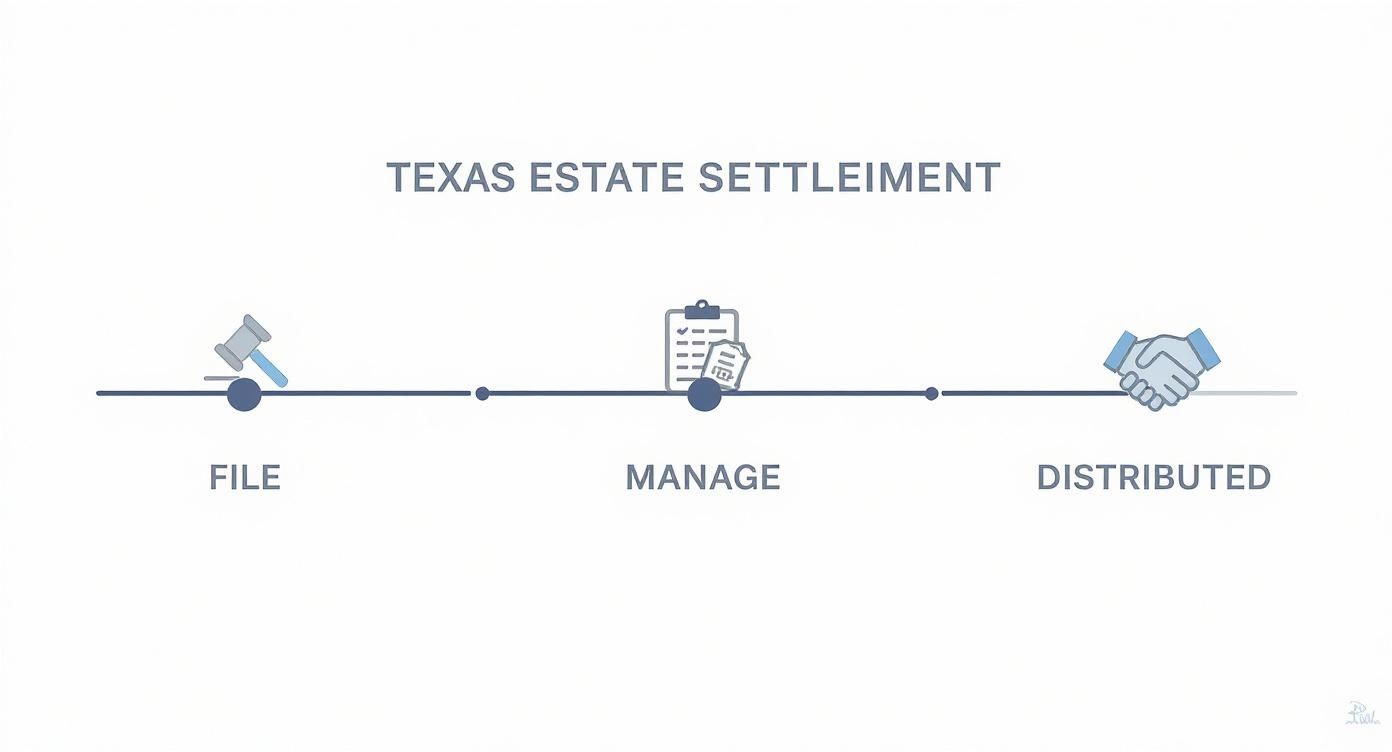
As you can see, the whole process is a sequence of building blocks. Each step depends on the one before it, which is why getting that initial filing right is so critical.
Obtaining Your Authority as Executor
After your court hearing, the judge will sign an order that officially names you as the executor. This is the moment you can finally get a crucial document called Letters Testamentary.
Think of Letters Testamentary as your official key to the estate. It is the court-issued document that proves you have the legal authority to manage the deceased's assets, communicate with banks, sell property, and handle all other estate business.
Without this piece of paper, banks and other institutions won't even talk to you, bringing the entire settlement process to a grinding halt. While every estate is different, the probate process in Texas typically lasts around 9 to 12 months. Of course, it can stretch beyond 18 months if the estate is particularly complex or the courts are backed up. National trends highlighted in a 2025 estate planning report show this is a common timeline across the country.
Successfully getting through these first 90 days is absolutely essential for keeping the entire process on schedule. For a deeper dive, our guide on navigating probate in Texas offers more practical tips for executors just starting out.
Cataloging Assets and Notifying Creditors
Once the court hands you the official Letters Testamentary, your role shifts. You are now the estate's manager, responsible for piecing together the complete financial puzzle of your loved one's life. This next leg of the journey is all about becoming an accountant for the estate, tasked with hunting down every last asset and every single debt.

This isn’t just some casual bookkeeping. It's a serious legal obligation. The Texas Estates Code is very clear: as the executor, you are required to file a document called an "Inventory, Appraisement, and List of Claims" with the probate court. This is a detailed, sworn statement that lists out everything the estate owned—and what it was worth—on the day your loved one passed away.
As you start wading through what can feel like mountains of paperwork, you'll find that effective document organization strategies are an absolute lifesaver. They can make a world of difference in keeping all the financial and legal documents straight.
Fulfilling Your Fiduciary Duties
As the executor, you've taken on a fiduciary duty. That's a legal term that basically means you have to manage the estate’s assets with the utmost responsibility. You’re legally bound to act in the best interest of the beneficiaries, protecting property from any loss and making smart, careful decisions.
During this phase, your main jobs include:
- Locating All Assets: This is the real detective work. You’ll be digging for bank accounts, retirement funds, property deeds, car titles, stock certificates, and any valuable personal items.
- Determining Asset Values: For things without a clear price tag, like real estate or a collection of rare art, you'll need to bring in professional appraisers to get an accurate value.
- Securing Property: This means taking practical steps to protect the assets. You might need to change the locks on a house, put a classic car into storage, or make sure investment accounts are being watched over.
This inventory is the absolute cornerstone of the entire settlement process. Getting it right prevents arguments down the road and guarantees that every heir gets their fair share. It gives the court and the beneficiaries a completely transparent look at what the estate owns and what it owes.
To give you a clearer picture of what you'll be looking for, here’s a quick breakdown of common assets and liabilities you might encounter in a Texas estate.
Common Estate Assets and Liabilities in Texas
| Category | Examples of Assets | Examples of Liabilities |
|---|---|---|
| Real Estate | Primary residence, vacation homes, rental properties, undeveloped land | Mortgages, home equity lines of credit (HELOCs), property tax liens |
| Financial Accounts | Checking and savings accounts, certificates of deposit (CDs), brokerage accounts | Credit card debt, personal loans, lines of credit |
| Investments | Stocks, bonds, mutual funds, retirement accounts (401k, IRA) | Margin loans on investment accounts, loans against retirement funds |
| Personal Property | Vehicles (cars, boats), jewelry, art, collectibles, furniture | Auto loans, boat loans, loans secured by personal property |
| Business Interests | Ownership stake in a partnership, LLC, or corporation | Business loans, outstanding vendor payments, other business-related debts |
This table is a great starting point, but remember that every estate is unique. The key is to be thorough in your search to ensure nothing is missed.
The Creditor Notification Process
While you’re busy cataloging all the assets, you have another critical task running on a parallel track: officially notifying creditors. This is a huge step that kicks off a legal countdown, giving them a specific window of time to come forward and make a claim for any money owed by the estate.
Typically, this process has two main components:
- Direct Notice: You have to send a formal notice by certified mail to any secured creditors you know about. Think mortgage companies or the bank that holds the car loan.
- Published Notice: You're also legally required to publish a general notice in a local newspaper. This is to catch any unknown creditors and let them know the estate has been opened.
This two-pronged notification process is designed to bring every potential debt out into the open so they can be sorted out before any assets are handed over to the heirs. If you don't follow these steps to the letter, you could be held personally liable for those debts. This is one of those areas where having a sharp Texas estate planning attorney in your corner is invaluable; they'll make sure every legal box is checked so the settlement process stays on track.
Managing Estate Debts and Filing Taxes
Once you have a complete picture of everything the estate owns, it's time to roll up your sleeves for the financial heavy lifting. This next phase is all about settling legitimate debts and tackling tax obligations. As the executor, Texas law puts you in a position of trust—a fiduciary duty—to handle these financial matters with absolute precision.
Getting this stage right is non-negotiable. It’s what protects the estate from future claims and paves the way for a smooth, final distribution to the beneficiaries. One of your first big jobs is to deal with the claims from creditors you notified earlier. You'll need to carefully review each claim to confirm it's valid, and then pay it using estate funds. Meticulous record-keeping isn't just a good idea here; it’s your best friend and legal shield.
Distinguishing Between Key Tax Filings
Here’s where many executors get tangled up: understanding the different tax returns that need to be filed. It’s easy to get them confused, but telling them apart is crucial to avoid penalties and keep the process from stalling out.
- The Decedent's Final Income Tax Return (Form 1040): Think of this as the person's last-ever personal tax return. It covers all the income they earned from January 1st of the year they died up until their date of death.
- The Estate's Income Tax Return (Form 1041): This one is for the estate itself, which the IRS sees as a whole new taxable entity. It reports any income the estate's assets generate after the date of death—things like interest from a savings account, dividends from stocks, or rent collected from a property.
Navigating these tax waters can feel overwhelming. For a deeper dive, you can learn more about tax planning strategies for estates in Texas in our detailed guide.
Understanding Federal Estate Taxes
The words "estate tax" can cause a lot of anxiety, but here’s some good news: for most people, it’s not something to worry about. Federal estate taxes only kick in for very large estates. The exemption amount is so high that the vast majority of estates in Texas won't owe a dime in federal estate tax.
Still, it's critical to determine if the estate's total value is anywhere near that threshold, because that will dictate whether a return even needs to be filed.
It's also worth remembering that outside forces can impact how long all of this takes. Big-picture changes in legislation or even global events can have a ripple effect. For instance, the upcoming expiration of certain estate tax exemptions in 2025 is prompting many families to get their planning in order sooner rather than later. A few years ago, the COVID-19 pandemic created massive court backlogs that stretched out settlement times for everyone.
An experienced Texas trust administration lawyer is your best guide through this financial maze. They can provide invaluable support to make sure every T is crossed and every I is dotted, correctly and on time.
Navigating Common Settlement Delays
Even with the best intentions and what looks like a straightforward will, the estate settlement process can hit some serious speed bumps. Knowing what these potential hurdles are ahead of time can help you tackle them head-on, stopping minor snags from turning into major, expensive delays.
Most hold-ups come down to one of three things: disputes, complicated assets, or administrative headaches. These issues can easily add months—or in really messy cases, even years—to the timeline, piling emotional and financial stress on everyone involved. Your best weapons against this are clear communication and quick, decisive action.
Will Contests and Beneficiary Disputes
One of the quickest ways to derail the process is a will contest. This is when an heir or beneficiary challenges the will itself, claiming things like the deceased was pressured, wasn't mentally sound when they signed, or the will wasn't executed properly. Fights can also break out between beneficiaries over how the executor is handling everything.
When these conflicts erupt, the whole settlement process can grind to a halt.
- Legal Limbo: A will contest is a full-blown lawsuit. It freezes all distributions until a judge sorts it out.
- Emotional Drain: Family feuds add a tough layer of personal stress to an already difficult time, making it nearly impossible for anyone to work together.
- Skyrocketing Costs: Litigation is expensive. Every dollar spent on lawyers is a dollar that doesn't go to the beneficiaries.
When you're up against these kinds of challenges, getting advice from a Texas trust administration lawyer is absolutely critical. An attorney can help mediate the arguments, defend the will in court, and make sure that every move you make as executor is by the book.
Complex Assets and Administrative Hurdles
Beyond family drama, the estate itself can be the source of major delays. Let's be honest, some assets are just a pain to manage, value, and sell.
An executor’s job is to always act in the best interest of the estate and its beneficiaries. When you’re dealing with complex assets, doing your duty means navigating a minefield of legal rules to protect the estate’s value.
Here are a few common asset-related roadblocks:
- Selling Real Estate: Just getting a house ready to list, finding a buyer, and getting to the closing table can take months, especially if the market is slow.
- Managing a Business: If the deceased owned a business, you're suddenly tasked with valuing it, keeping it running, and figuring out how to sell or transfer it. That’s a massive undertaking.
- Finding Hidden Assets: Sometimes, tracking down every last bank account, investment, or piece of property can feel like a treasure hunt that drags on and on.
- Surprise Creditor Claims: Just when you think you're in the clear, a creditor you never knew about can pop up with a claim, forcing you to investigate and negotiate before you can close the estate.
Staying proactive and getting professional help is the key here. Whether it's bringing on a real estate agent, a business appraiser, or an attorney to handle creditors, getting the right experts involved early can save you a world of time and trouble.
If you are managing an estate and run into these or any other delays, you don't have to figure it out alone. The compassionate attorneys at The Law Office of Bryan Fagan, PLLC are here to provide clear, trusted guidance.
Final Accounting and Distributing to Heirs
You’ve reached the home stretch. Crossing the finish line in an estate settlement is a huge milestone, but there's one last, critical leg of the race before any assets change hands. This final stage is all about transparency, accountability, and bringing your duties as executor to a responsible close.

Under the Texas Estates Code, the law requires you to prepare a complete and accurate final accounting. Think of it as the estate's financial diary. It's a detailed report that has to show every single dollar that came into the estate and every dollar that went out. This isn't just paperwork; it’s your official record proving you managed everything by the book.
This document is your best protection against any future legal headaches. It gives the beneficiaries and the court a crystal-clear history of your actions, showing that you fulfilled your fiduciary duties with integrity.
The Step-by-Step Distribution Process
Once the court gives your final accounting the thumbs-up, you get the green light to start distributing what’s left. A word of caution: this must be done exactly as the will spells out. Rushing this part or making assumptions can land you in hot water, making you personally liable for any mistakes. Precision is everything here.
The distribution process usually unfolds in a few key steps:
- Drafting Distribution Receipts: For every item an heir receives, they need to sign a legal document confirming they got it. This simple piece of paper is your proof of distribution and officially releases you from any further responsibility for that asset.
- Transferring Titles and Deeds: If you're dealing with property like a house, land, or a car, you'll need to legally transfer the title from the estate's name to the new owner.
- Closing Estate Accounts: Any bank or investment accounts you opened specifically for the estate can now be closed. Once they are, the final funds can be paid out to the beneficiaries.
The need for a clear and efficient settlement process is more important than ever. A recent analysis revealed that nearly 58% of adults in the U.S. don't have the essential estate planning documents in place, a situation that almost guarantees delays. Because of this, the global market for legal services in this area is expected to grow. You can read more about these estate planning trends and what they mean for families.
A meticulously prepared final accounting and a well-documented distribution process are not just legal formalities. They are the cornerstones of a successfully settled estate, providing peace of mind to both the executor and the heirs.
Once you’ve successfully wrapped up this final stage, your responsibilities are officially over. You've navigated a complex legal journey, honored your loved one’s last wishes, and brought the estate to a peaceful and orderly close.
Common Questions About Settling a Texas Estate
Working through an estate settlement for the first time will naturally bring up a lot of questions. Let’s tackle some of the most common concerns families have during this process, giving you clear, straightforward answers to help you move forward with confidence.
Can I Distribute Assets Before Paying Debts?
That’s a hard no. The Texas Estates Code is crystal clear on this: all legitimate debts, taxes, and estate expenses have to be settled before a single dollar goes to the heirs.
Think of it like closing out a business. You have to pay your suppliers and your final bills before the owners can take their profit. If an executor jumps the gun and pays beneficiaries early, they could be held personally liable for any unpaid estate obligations. It’s a legal order of operations you simply can't ignore.
What Happens if There Is No Will?
When someone passes away without a will (what the law calls "intestate"), the whole settlement process gets longer and more tangled. Instead of following the deceased's written instructions, the probate court has to step in.
The court's first job is to appoint an administrator. Then, it has to legally determine who the heirs are based on a rigid formula set by Texas succession laws. This adds extra steps, court hearings, and unfortunately, can sometimes spark family disagreements that drag things out even longer. When an estate gets complicated, or if you just want an expert guide, bringing in dedicated Will And Trust Lawyers can make all the difference.
How Much Does Settling an Estate Cost?
This is one of those "it depends" answers, and for good reason. The costs can swing wildly based on the estate's size and complexity, and whether any disputes pop up along the way.
You can always expect some baseline expenses, like court filing fees, the executor's compensation, appraisal costs for property, and attorney's fees. A simple, uncontested probate where everyone is in agreement will always be far less expensive than a complicated estate that ends up in litigation.
If you’re managing a trust or planning your estate, contact The Law Office of Bryan Fagan, PLLC for a free consultation. Our attorneys provide trusted, Texas-based guidance for every step of the process at https://texastrustadministration.com.

